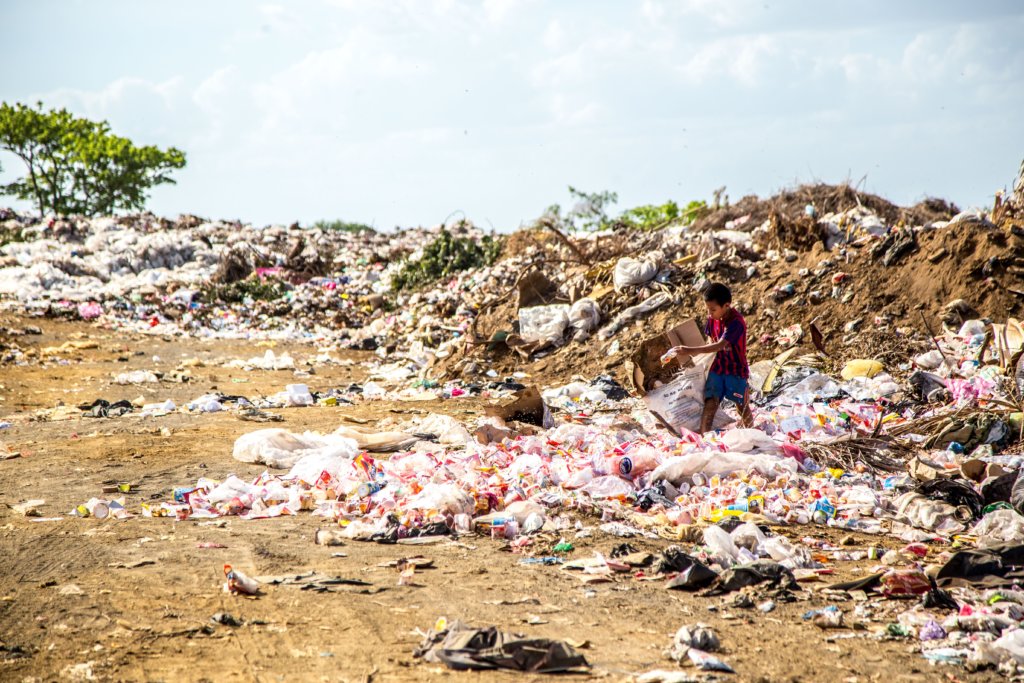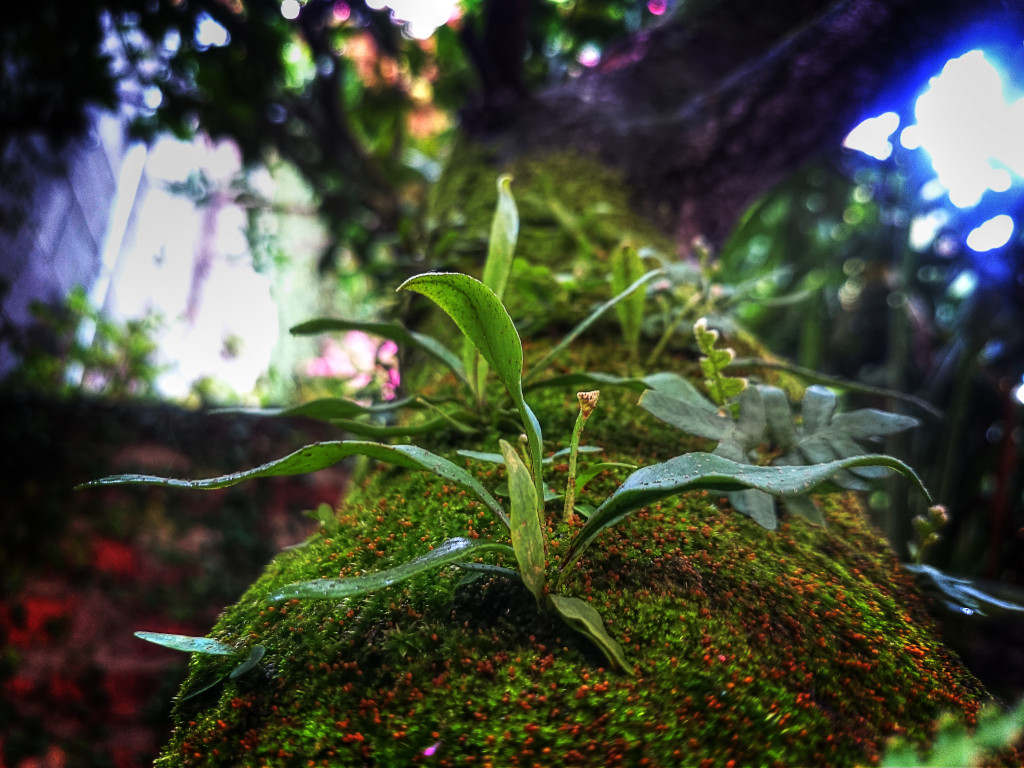I watched a chilling Walmart commercial the other day. The premise: A child keeps spitting out a pacifier, which the family’s dog then slobbers all over. The kid also drops a sippy cup in the mud. The mother decides to reorder pacifier after pacifier and cup after cup instead of sterilizing the originals. The commercial ends with the dog surrounded by pacifiers and the mom patting the dog with a “What can you do?” sort of smile on her face. In the background, singers croon, “I just can’t get enough, I just can’t get enough.”
The commercial, and the message behind it, horrifies me. Particularly in the light of all our environmental problems. A friend shared a post on facebook recently depicting the state of our world’s beaches in Bali, the Philippines, Hawaii. Gone are pristine sandy shores. In their place we have cups and cutlery, we have bottles and bags. In the comments many people said, “Pick up after yourselves! Throw stuff away!” I agree, throw stuff away, but that doesn’t address the whole problem.
According to Greenpeace, even when plastic waste is collected, it can blow away and end up in rivers or oceans. Major rivers around the world carry an estimated 1.15 million to 2.41 million tons of plastic into the sea every year – the equivalent of 100,000 garbage trucks. Not all of that comes from plastic blowing away, obviously it also comes from littering, but I’d like to point out the trash still goes somewhere. We think once the garbage truck picks it up the problem is solved, but it’s not. Commercials like Walmart’s divorce us from the consequences of our actions. Reordering one pacifier after another because the dog drooled all over it and throwing perfectly good pacifiers away contributes to waste. I read somewhere that the most important part of the mantra “reduce, reuse, and recycle” is “reduce,” but that doesn’t contribute to economic growth so we don’t focus on it as much.
In yogic philosophy there is a tenet called aparigraha. It means non-indulgence. Specifically, not indulging in the amenities and comforts of life that are superfluous for the preservation of physical existence. Usually people have a hard time with that one. “Does that mean I can’t buy the latest iphone? What about a new computer? Am I supposed to live in the woods off of rainwater and tree bark?” Yes! Just kidding. We can’t all live in the woods. Also, what is essential for our survival changes with time, place, and person. Perhaps 10 years ago it wasn’t crucial for everyone to have internet, but these days in my community it’s another utility like gas and electricity.
What I never grasped until watching the Walmart commercial is aparigraha isn’t about deprivation. It’s not being a martyr, living off of less so that everyone gets their fair share. Non-indulgence at least from my perspective is about Earth. It’s about paying respect to Mother Nature and realizing that my actions contribute to the destruction of the environment, and destroying the environment means more pollutants and poorer health. It means wiping out certain species. It means natural disasters like the ones we’re currently experiencing. If the environment we reside in becomes a toxic wasteland, where are we supposed to go?
I could end this post here and proclaim the planet is doomed and we’re all screwed, but I won’t. I want to again go back to one of my favorite quotes from my spiritual teacher who said, “Difficulties can never be greater than your capacity to solve them.” Did you know scientists recently created an enzyme that eats plastic? It turns plastic back into a more usable form. I’m confident more things like that will happen, but more mindfulness is required on our part. Breaking our addiction to consumerism and thoughtlessness will go a long way in creating a world in which we all want to live.
I dream of a world where we reduce our consumption. A world where we think twice before casually throwing something away. A world where we understand non-indulgence helps the environment and ultimately helps us. A world where we treat nature with the care and reverence it deserves.
Another world is not only possible, it’s probable.
I hear quite often that life is an illusion, or a dream. People say that only heaven is real and what we’re experiencing is a very realistic movie.
I sort of understand this perspective, because as I’ve written about before, I have a practice whereby I ascribe God-hood to everything, even inanimate objects. I do that to remind myself the keys I’m typing on are not keys, they are God in the form of keys. So if people are saying life is an illusion because everything is really an expression of God, then I can get behind this “life is an illusion” business.
However, what I often see is people use the concept of life as an illusion to be apathetic and not do anything. If life is really an illusion, does it matter that there are wildfires raging in California? Does it matter that some people live in squalor while others live in opulence? If life is a realistic movie, then what’s the point of intervening? Instead, all we’re experiencing is a temporary projection, a way to pass the time until we get to the good stuff, until we get to heaven.
Friends, this is not an attitude I can abide by. I mean, I get it. It’s very appealing to think life is an illusion because then all the horrible stuff that goes on in the world doesn’t really matter and we don’t have to get upset about it. We can soothe ourselves like kids waking from a nightmare by saying, “It was just a dream.” However, even if we are living in a dream or a realistic movie, we all have a part to play. We were assigned roles and those roles must be fulfilled, otherwise the movie would be very boring. All good stories have conflict and resolution. If we take the attitude life is an illusion and rest on our laurels, life is all conflict and no resolution.
I honestly don’t see how saying, “life is an illusion” is helpful. However, I’m about to get all contradictory here because in yogic philosophy there is a concept called Máyá, who is the Supreme Creative Principle. Máyá is responsible for all of creation and is often translated as illusion precisely because the yogis are encouraging us to see the world as it really is: an expression of the divine.
My spiritual teacher says, “When people attain supremacy over Máyá through their … [spiritual efforts or meditation], the veil of darkness moves aside from their minds and then there remains no difference between their own self-effulgence and the Brahmic effulgence – both are fused into one.”
I guess what I’m saying here is why wait for heaven? Why postpone happiness and the good stuff for a time that may never come? As someone who believes in reincarnation, I’m going to keep cycling through a human life over and over again. If I don’t believe in heaven, does that mean I’ll never experience reality? That I’ll live in an endless illusion? That sounds pretty horrible to me. I’d rather bring enlightenment, bliss, and freedom to the present day by recognizing life is sort of an illusion. The illusion is not life itself, but rather that physical objects are all that exist, that material goods are all that matter. The illusion is believing we and everything around us are anything less than bright, shining lights of divinity.
I dream of a world where instead of viewing life as an illusion we view it as a projection of divinity. A world where we bring enlightenment, bliss, and freedom into the present moment. A world where we do what we can to uplift all of humanity and make heaven a real place that exists on Earth.
Another world is not only possible, it’s probable.
Last week I had a conversation with someone about sounds and mantras and why is “om” used in so many of them?
The short answer is “om,” also spelled “aum,” is the sound of the universe. By the way, this isn’t limited to the beliefs of yogis – it also shows up in the bible. In the book of John, starting from the first verse it says, “In the beginning was the Word, and the Word was with God, and the Word was God. All things were made by him; and without him was not any thing made that was made.”
I interpret the “word” here to be synonymous with sound because words are sounds. When I read a word, I’m repeating it in my head, using my voice, so it’s a sound, just not one others can hear, unless I’m muttering to myself.
At first blush, the notion that there’s a sound to the universe and that it’s om seems kind of silly. There are many sounds in the world from refrigerators humming to birds chirping to cars honking, and that sure doesn’t sound like a ceaseless om the likes of which you’d hear in a yoga class.
What’s interesting to think about is how given distance, sounds blend together. From far away, a farmer’s market sounds like a medley of chatter, but when I get closer, I hear kids crying and people asking for chard and couples laughing. Just as all of the sounds of the farmer’s market are blended into one roaring soundwave, maybe all the sounds of the universe are blended into the unified form of all sounds: om. Perhaps what’s going on here is my ears are not sensitive or powerful enough to hear the universal sound, and two, I can’t adequately recreate the sound of om in this human form.
Here’s something else that’s neat about om. Om/aum consists of five symbols: a, the acoustic root of creation; u, the acoustic root of preservation; ma, the acoustic root of destruction; the dot, the symbol of the unmanifested universe; and the crescent, the symbol of the process of manifestation. More succinctly, om is the acoustic root of creation, preservation, and destruction, plus the principle of transmutation from the unmanifested to the manifested. In its very make up om is an encapsulation of the universe! How cool is that?
I find it fascinating that something as complex as the cycle of life and death can be boiled down to a symbol, and furthermore, that symbol is a sound our universe makes. There’s something neat to me about how om is like a seed containing everything within it. That perhaps even things that are seemingly complex are actually quite simple but I don’t have enough information to see them that way.
I dream of a world where the complex is made simple. A world where we use om as an example of how individual differences can be made to blend into something universal. A world where we can decipher om in all the sounds we can hear.
Another world is not only possible, it’s probable.


